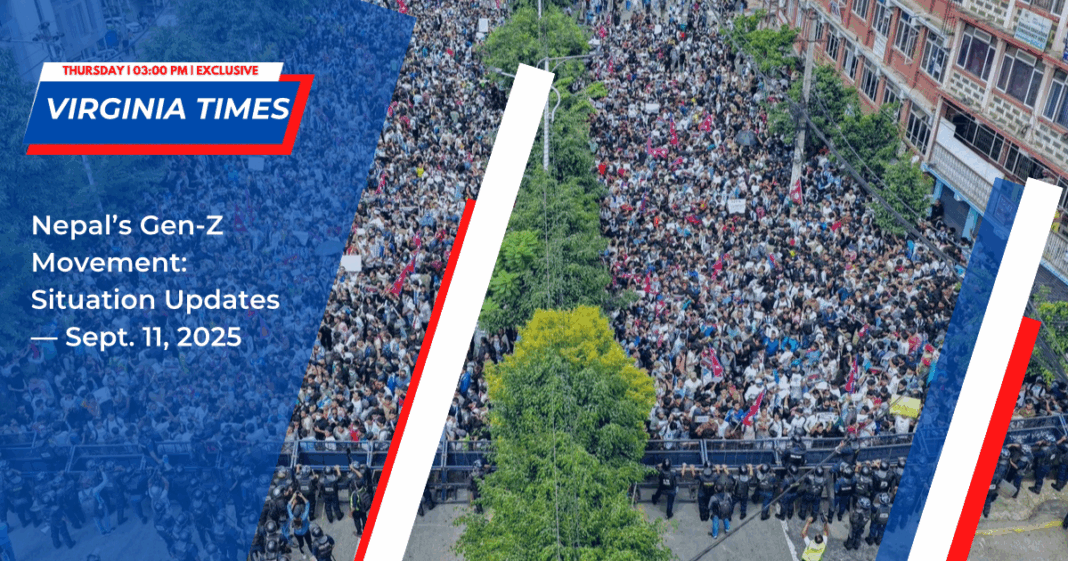Here’s a quick summary political development in Nepal today: The curfew hours in Kathmandu were pushed back by an hour. Top leaders asked for calm, parties suggested interim-government possibilities with Gen-Z participation, and courts set habeas corpus hearings. The day also saw more reviews of the damage done by recent riots and how people reacted at facilities that were set on fire.
Yes — placing the contents in a more logical chronological and thematic order makes the article clearer and easier to follow, while still keeping all original sentences intact. Here’s the full reordered version with the added content properly placed:
Kathmandu on Edge: Curfew Eases, Tensions Rise
Security Measures
The Nepali Army has continued the prohibition order and curfew in the Kathmandu Valley, but has reduced the duration of the prohibition. Previously, the prohibition was implemented from 10 AM, but from Friday it will only be implemented from 11 AM.
High-Level Meeting
President Ramchandra Paudel and Chief of Army Staff Ashokaraj Sigdel had a meeting on Thursday evening.
During this, sources say that the Chief of Army Staff briefed about the dialogue efforts made so far with the Gen-Z group.
President’s Statement
While major political parties and concerned parties are searching, President Ramchandra Paudel issued a statement on Thursday. After leaving the office when the President’s Office Shital Niwas was burnt on Bhadra 24 during the Gen-Z movement, Paudel has not been seen publicly.
Issuing a statement, Paudel urged all parties to exercise restraint in the current adverse situation of the country and appealed for cooperation to maintain peace and order. He informed that efforts are being made to provide an exit to the country within the constitutional framework.
Former President’s View
Former President Bidya Devi Bhandari has expressed confidence that Nepal as envisioned by Gen-Z will be even more democratic and progressive. Making her views public through a public statement on Thursday, she said that this constitution, which stands as a symbol of sacrifice, dedication and martyrdom of the Nepali people, is an excellent constitution.
Scale of Unrest
After the Gen-Z movement, Nepali politics has taken a different turn. When the demonstrations became violent, arson and vandalism occurred at the Presidential Palace, Singha Durbar, Supreme Court, many government offices, police offices, leaders’ homes, private homes and commercial centers. During the movement, at least 34 people lost their lives while more than a thousand were injured. The injured are being treated in various hospitals.
The Ministry of Health and Population has informed that the number of deaths during the nationwide Gen-Z movement has reached 34.
Public Health Impact
After all these incidents, mental stress like restlessness, anxiety, insomnia, and despair has increased among common citizens.
Civil Society Concern
A group of citizens has expressed serious concern about the incident where the peaceful movement started by Gen-Z unexpectedly turned violent.
Saying that the government’s unnecessary use of force in the movement that started from Bhadra 23 caused huge loss of life and property, members of the citizen group have demanded the formation of an investigation commission and action against the guilty.
Political Calls for Transition
Saying that the country is going through an abnormal situation, 16 leaders have urged for the immediate formation of an interim government in a constitutional manner.
After the Gen-Z movement, a new situation has developed in the country. Debates and discussions are ongoing about the need for a clear roadmap for the creation of Nepal and the Nepali people’s destiny and future.
The decisions taken after those debates and discussions will become the main basis for building the future of the country and citizens. Meanwhile, major political parties have come forward in favor of an ‘exit’ through constitutional processes.
Party Positions on Interim Government
The Rastriya Swatantra Party (RSP) has stated that it will support the candidate proposed for Prime Minister through all-party consensus with the mandatory participation of the Gen-Z generation.
Party’s Acting Chairman Dolprasad Aryal issued a statement on Thursday evening expressing best wishes that such a candidate would receive broad political endorsement.
“RSP considers it appropriate to balance between the inevitability of a fresh mandate and the movement’s mandate by maintaining the permanent nature and dynamism of the National Assembly and having the interim government conduct the next House of Representatives election within 6 months,” the statement mentions.
In accordance with the spirit of the Gen-Z movement, the Bibeksheel Sajha Party has appealed to end the political deadlock by forming an interim civilian government under the leadership of Sushila Karki by the President.
Bibeksheel Sajha has also expressed confidence that forming an electoral government under the leadership of former Chief Justice Karki would lead to an easy political exit.
Judiciary Update
The Supreme Court will conduct regular hearings on habeas corpus petitions from Bhadra 29.
Specific Incidents
During the Gen-Z movement, vandalism and arson also took place at the Parliament building, Singha Durbar, President’s Office, Supreme Court as well as the Minister’s residence at Bhainsepati, Lalitpur. Protesters burnt the Minister’s residence on Tuesday.
Public Reaction at Deuba Residence
Crowds of general public have gathered at the house of Nepali Congress President and former Prime Minister Sher Bahadur Deuba, which was set on fire during the Gen-Z movement.
It can be seen that they are searching by sifting through ashes hoping to find important items in the house. Common people who could not enter Deuba’s house under normal circumstances have also shown surprise seeing the luxurious house and the area around the house.
A global media for the latest news, entertainment, music fashion, and more.














